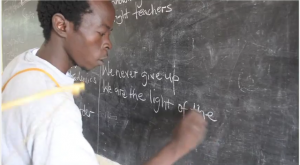Kalamazoo College has announced the ten finalists for its 2015 Global Prize for Transformative Social Justice Leadership, a juried competition hosted by the College’s Arcus Center for Social Justice Leadership. Finalists will present during a Prize Weekend, Oct. 9-11, and one project will receive a $25,000 prize. Below is one in a series of profiles on the ten finalists.
We invite individuals who are familiar with this project to use our Community Input form to comment on its “grassrootedness” and transformative leadership practices. Input received before September 8 will be submitted to our jurors. Please see videos submitted by each finalist, as well as our rubric and other information about the Global Prize here.
A Ugandan organization working to empower youth in the east African nation is using several elements of modern, popular arts and culture to reunite younger generations with their pasts.
For ten years, the Bavubuka Foundation has been exposing youth to music and the arts as a way to transform lives and unify diverse communities. The organization does this by reconnecting young leaders to their authentic indigenous roots and developing their understanding of the value of their culture and heritage.
“Many in the younger generations have left the villages and the countryside for the cities, and in the process have become disconnected from their heritage,” says Silas Balabyekkubo, aka, ‘Babaluku,’ founder and executive director of the foundation.
“Modern culture has uprooted the old ways. But we are turning that on its head, using modern culture as a vehicle to enable youth to get back in touch with their roots and express the newfound pride they have in their indigenous communities and pasts.”
Uganda has one of the world’s largest youth populations, many of whom have minimal resources and few platforms to be heard.
The foundation, which takes its name from the Luganda word for ‘youth,’ provides spaces, education and opportunities for youth to express their indigenous heritage in several ways. Their expression takes the form of storytelling through music, photography, journalism, dance, fashion, sustainable agriculture, and entrepreneurship.
The most popular form of expression is urban hip-hop, with the country becoming a wellspring of young emcees utilizing a type of rap called “Lugha Flow,” Swahili for ‘language’, to vocalize community issues and solutions, celebrate the wisdom of their elders and encourage the preservation of native languages.
“Regardless of what it is, the message from the youth is the same: that the truth of my past comes from my land, my culture and my language,” says Babaluku. “Youth are recognizing that, even though they may not live in their indigenous communities, they take the wisdom of their elders with them. They don’t disregard where they came from just because times have changed.”
The movement has seen a merging between old and young, an acceptance between the generations as they share an appreciation for a shared cultural experience and identity, the traditional both respected and remade within new, progressive art forms, Babaluku says.
“We are seeing kids doing some really inspiring work, and in the case of music, using indigenous hip-hop as a tool to tap into untapped leadership potential. “Theirs is a new, authentic voice that is being used to advocate for solutions, while breaking tribalism and other stereotypes, through the passion of hip-hop and other arts. The message is reconnection, restoration, healing and awakening to their authentic, true selves. It’s spreading everywhere. We are galvanizing multitudes because of the appeal of the arts.”

